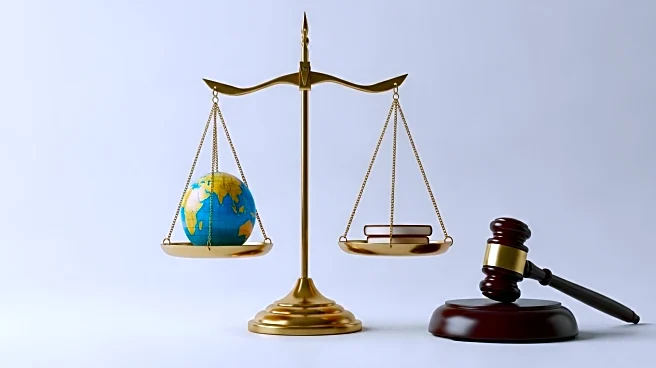What's Happening?
Recent shifts in regulatory requirements for corporate social responsibility and sustainability reporting have prompted concerns about the potential weakening of human rights protections within corporate operations. Despite some jurisdictions relaxing these mandates, companies are still expected to mitigate and prevent adverse impacts on human rights, particularly concerning vulnerable populations such as children. Legal experts emphasize the importance of general counsel maintaining oversight to avoid legal, business, and reputational risks associated with human rights abuses. The UN Guiding Principles on Business and Human Rights and the OECD Guidelines for Multinational Enterprises provide a stable framework for embedding respect for human rights into business processes, even amidst regulatory uncertainty.
Why It's Important?
The evolving regulatory landscape poses significant challenges for multinational corporations, as inconsistent approaches to human rights compliance can lead to uncertainty and potential business disruptions. Companies that fail to uphold human rights standards risk facing shareholder lawsuits, government scrutiny, and erosion of consumer trust. By integrating respect for human rights, particularly children's rights, into their business strategies, companies can avoid these consequences and enhance their reputation. Legal counsel plays a crucial role in guiding companies through these complexities, ensuring adherence to international frameworks and maintaining supply chain diligence.
What's Next?
As regulatory requirements continue to shift, companies must remain vigilant in their human rights compliance efforts. Legal counsel is advised to reinforce international frameworks such as the UNGPs and OECD Guidelines, embedding them into company policies to create stability. Regular risk mapping, supplier audits, and stakeholder engagement are essential practices to preempt crises and strengthen credibility. Companies are encouraged to frame human rights due diligence as a form of resilience, protecting against reputational damage and strategic instability. Focusing on children's rights within supply chains and digital environments will be crucial in mitigating risks and fulfilling legal mandates.
Beyond the Headlines
The balance of power in enforcing human rights has increasingly shifted from governments to corporations. While governments set regulatory baselines, corporations have the ability to shape labor markets and access to essential goods and services. Civil society and NGOs can raise alarms, but lack the insight into corporate supply chains necessary for effective policing. As such, companies hold significant power in preventing harm, particularly to children, through procurement policies and digital design choices. Legal counsel must act as the business conscience, navigating ambiguous regulatory landscapes to uphold human rights standards.








